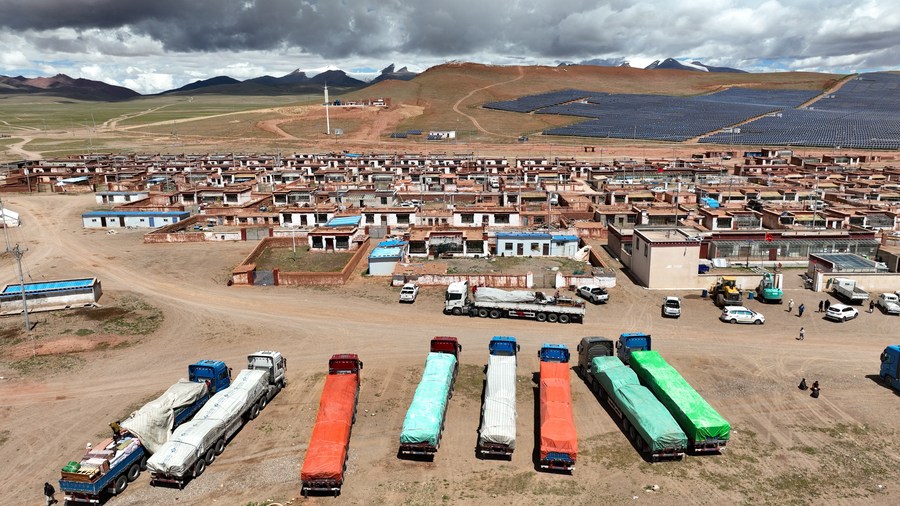Better living conditions secure borders
 0 Comment(s)
0 Comment(s) Print
Print E-mail China Daily, March 15, 2023
E-mail China Daily, March 15, 2023

Aerial photo taken on July 13, 2022 shows trucks carrying furniture preparing to depart from Doima Township of Tsonyi County, southwest China's Tibet Autonomous Region. [Photo/Xinhua]
The population is growing in the border areas of the Tibet autonomous region, with improved living conditions and road network being a contributing factor, resulting in a safer and more stable border and safeguarding national security, according to a National People's Congress deputy.
Tashi Gyaltsan, an NPC deputy of the Tibet autonomous region and head of Doyul Lhoba ethnic township in Lhunze county, said infrastructure in all 28 villages in the county near the border between China and India has been modernized, benefiting more than 6,000 people.
"Those villages are now connected by roads in good condition. Furthermore, the road network in the border area is expected to be further improved in the future," said Tashi Gyaltsan, a member of the Lhoba ethnic group.
Improved transport infrastructure in recent years has paved the way for development, and new roads have allowed people to get to townships and villages in border areas more conveniently throughout the year.
"In the past, Yulmed township, surrounded by mountains, would be cut off by heavy snow in the winter for months. After the completion of a road by the end of 2020, the problem has been solved. What's more, an airport in Lhunze is now operational, which will surely boost the development of the county," Tashi Gyaltsan said.
All three villages of Doyul Lhoba ethnic township have running tap water and electricity, and infrastructure such as roads and the internet. People's living standards have been significantly improved in all aspects, he said.
The population is growing in the border areas of the Tibet autonomous region, with improved living conditions and road network being a contributing factor, resulting in a safer and more stable border and safeguarding national security, according to a National People's Congress deputy.
Tashi Gyaltsan, an NPC deputy of the Tibet autonomous region and head of Doyul Lhoba ethnic township in Lhunze county, said infrastructure in all 28 villages in the county near the border between China and India has been modernized, benefiting more than 6,000 people.
"Those villages are now connected by roads in good condition. Furthermore, the road network in the border area is expected to be further improved in the future," said Tashi Gyaltsan, a member of the Lhoba ethnic group.
Improved transport infrastructure in recent years has paved the way for development, and new roads have allowed people to get to townships and villages in border areas more conveniently throughout the year.
"In the past, Yulmed township, surrounded by mountains, would be cut off by heavy snow in the winter for months. After the completion of a road by the end of 2020, the problem has been solved. What's more, an airport in Lhunze is now operational, which will surely boost the development of the county," Tashi Gyaltsan said.
All three villages of Doyul Lhoba ethnic township have running tap water and electricity, and infrastructure such as roads and the internet. People's living standards have been significantly improved in all aspects, he said.






Go to Forum >>0 Comment(s)